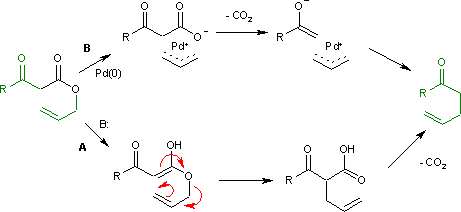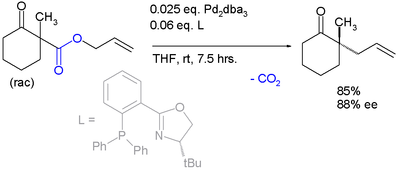The Carroll rearrangement is a rearrangement reaction in organic chemistry and involves the transformation of a β-keto allyl ester into a α-allyl-β-ketocarboxylic acid. This organic reaction is accompanied by decarboxylation and the final product is a γ,δ-allylketone. The Carroll rearrangement is an adaptation of the Claisen rearrangement and effectively a decarboxylative allylation.
The Carroll rearrangement (1940) in the presence of base and with high reaction temperature (path A) takes place through an intermediate enol which then rearranges in a sigmatropic Claisen rearrangement. The follow-up is a decarboxylation. This rearrangement is used in the conversion of linalool to geranylacetone.

Palladium-catalyzed processes
With palladium(0) as a catalyst, the reaction (Tsuji, 1980) is much milder (path B) with an intermediate allyl cation / carboxylate organometallic complex.

Decarboxylation precedes allylation as evidenced by this reaction catalyzed by tetrakis(triphenylphosphine)palladium(0):

Asymmetric decarboxylative allylation
By introducing suitable chiral ligands, the reaction becomes enantioselective.
The first reported asymmetric rearrangement is catalyzed by tris(dibenzylideneacetone)dipalladium(0) and the Trost ligand:

A similar reaction uses additional naphthol.

This reaction delivers the main enantiomer with 88% enantiomeric excess. It remains to be seen if this reaction will have a wide scope because the acetamido group appears to be a prerequisite.
The same catalyst but a different ligand is employed in this enantioconvergent reaction:

The scope is extended to asymmetric α-alkylation of ketones masked as their enol carbonate esters:

References
- Carroll, M. F. "131. Addition of α,β-unsaturated alcohols to the active methylene group. Part I. The action of ethyl acetoacetate on linalool and geraniol". Journal of the Chemical Society 1940, 704–706. doi:10.1039/JR9400000704
- Charles S. Sell (2013), "Terpenoids", in Arza Seidel; et al. (eds.), Kirk-Othmer Chemical Technology of Cosmetics, John Wiley & Sons, pp. 247–374, ISBN 978-1-118-40692-2
- Palladium-catalyzed rearrangement of allylic esters of acetoacetic acid to give γ,δ-unsaturated methyl ketones Tetrahedron Letters, Volume 21, Issue 33, 1980, Pages 3199-3202 Isao Shimizu, Toshiro Yamada and Jiro Tsuji doi:10.1016/S0040-4039(00)77444-2
- ^ Asymmetric Allylic Alkylation of Ketone Enolates: An Asymmetric Claisen Surrogate Erin C. Burger and Jon A. Tunge Org. Lett.; 2004; 6(22) pp 4113 - 4115; (Letter) doi:10.1021/ol048149t
- Enantioselective Palladium-Catalyzed Decarboxylative Allylic Alkylations Shu-Li You and Li-Xin Dai Angew. Chem. Int. Ed. 2006, 45, 5246 – 5248 doi:10.1002/anie.200601889
- Kuwano, R.; Ishida N.; Murakami, M. "Asymmetric Carroll rearrangement of allyl α-acetamido-β-ketocarboxylates catalysed by a chiral palladium complex". Chemical Communications 2005, (31), 3951–3952. doi:10.1039/b505105c
- Deracemization of Quaternary Stereocenters by Pd-Catalyzed Enantioconvergent Decarboxylative Allylation of Racemic b-Ketoesters Justin T. Mohr, Douglas C. Behenna, Andrew M. Harned, and Brian M. Stoltz Angew. Chem. Int. Ed. 2005, 44, 6924 –6927 doi:10.1002/anie.200502018
- Palladium-Catalyzed Asymmetric Allylic α-Alkylation of Acyclic Ketones|authpr=Barry M. Trost and Jiayi Xu J. Am. Chem. Soc.; 2005; 127(49) pp 17180 - 17181; (Communication) doi:10.1021/ja055968f